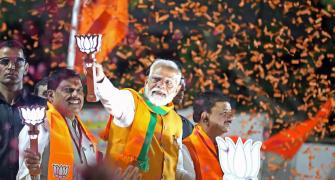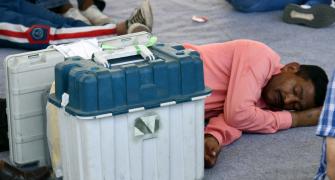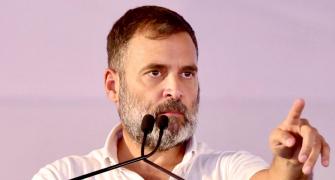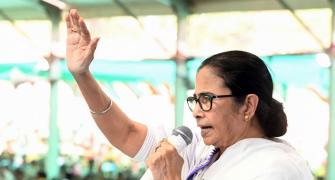Of late, India has started capturing the imagination of top business schools in the United States. Catch tomorrow's global leaders and hard sell them the India story today. That seems to be the slogan.
In a unique initiative, members of the Indian Diaspora based in the United States plan to project the India growth story in all its dimensions to students at the Chicago Graduate School of Business on May 7.
The inaugural conference -- which is being organised by the South Asia Business Group (SABG, a student-run group at the B-school) and being supported by India Brand Equity Foundation (IBEF) -- will specifically focus on:
- The coming of age of the Indian economy and its capital markets;
- The growth in venture capital;
- Investment management
- Healthcare sector;
- Consumer retail;
- Financial services; and
-
Infrastructure investments.
These topics will be explored through keynote speeches and panel discussions featuring some of the most prominent business and academic figures in these areas.
Speakers and panelists, handpicked from the Indian Diaspora, include Sam Pitroda, CEO WorldTel; Sumir Chadha, Founder, WestBridge Capital; and Ajai Chaudhary, senior scientist at Eli Lilly.
Apart from these, there will be other speakers from McKinsey & Co., Eli Lily, Whirlpool Corporation, Oppenheimer, Wal-Mart, McDonald's. A number of investment banks and venture capital funds will also be represented, as will Indian organisations like Wipro, which has a key presence in the US.
"There is a huge pent-up demand at the Chicago GSB to learn more about India, its new economy and its culture. A case in point: The SABG recently hosted a brief panel discussion for a business delegation from India led by Sunil Kant Munjal, President, Confederation of Indian Industry. We had originally planned on an MBA student audience of 110-120, but the actual attendance turned out to be more like 200, surpassing our expectations," says Hozef Arif, President, SABG.
Support to the conference is part of IBEF's ongoing strategy to increase its footprint across the global b-school arena and enhance India's brand equity, especially in key investor destinations such as the US.
The US is India's largest business partner with bilateral trade between the two countries exceeding $21 billion in 2004.
By supporting events such as this 'Investing in India' conference at Chicago GSB, IBEF wants to project India beyond the IT sector and the BPO industry. It seeks to project India's potential as a manufacturing hub, especially for design and knowledge industries. It would also like to highlight the unprecedented boom in healthcare and life-sciences sector, the growing consumerism, and the overall attractiveness of India as a growth and investment market.
"If we can create positive mindspace about India in the 20-30 age group, half our work is done. These are the people who will be leaders in their fields when India emerges as one of the world's top 3 economies over the next two decades,'' points out Ajay Khanna, Chief Executive Officer, India Brand Equity Foundation.
According to him, IBEF will support more such India-specific events being planned at other global B-schools.
Events like these play an important role in increasing curiosity levels on India.
For example, at the Harvard event in 2004 -- billed as the 'India Business Conference -- more than 700 people turned up. The event had over 40 speakers of Indian origin, representing top organisations in the US and India, including McKinsey, Pfizer, HSBC, Norwest Venture Partners, Microsoft and Morgan Stanley.
Over the last 2 years, leading business schools like Kellogg, Harvard, Stanford and Wharton have organised annual India trips to familarise their students with the world's fastest growing democracy. More than a dozen Indian companies now figure as case studies at these schools, and now the latest trend is for business schools to organise India specific conferences.
"There's a tremendous interest in understanding two things -- the emergence of the Indian economy on the global scene, and its important role in the decoupling of services from where work is done and where it is delivered," Patrick T Harker, dean of the Wharton School told the New York Times in 2004.
India is also gaining increasing US mindshare because of healthy business ties. Bilateral trade between the two countries crossed $ 21 billion in 2004, and US companies like GE, Coke and Oracle have some of their most lucrative worldwide businesses in India.
Then of course, there's the issue of growing credibility in the media. Newsweek in 2004 said India was the 'Best country to be an investor in.' Businessweek ran several covers over 2003 and 2004, and its interest in the country hasn't abated.
A Goldman Sachs report (Dreaming with BRICs: The Path to 2050) states that among Brazil, Russia, India and China (BRIC), India will grow the fastest over the next few decades. At its present rate of growth, the burgeoning economy of the country 'would be adding nearly one France every 3.5 years and one Australia every year.'
In 2004, a global survey of corporate investors ranked India as the second most attractive destination for foreign direct investment, after China, and ahead of the US.
In 2003, India was ranked sixth.
When India first started it's economic reforms process in 1991, it was a small blip on the US business scene. Fifteen years and its now part of the global B-school curriculum. The journey's paid off, and IBEF's biggest objective is to sustain this momentum.






